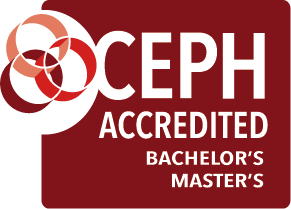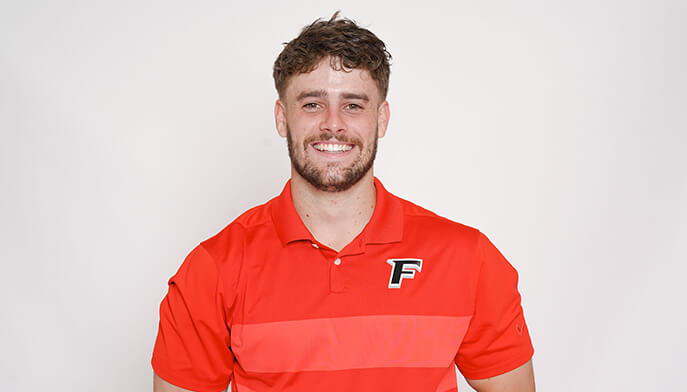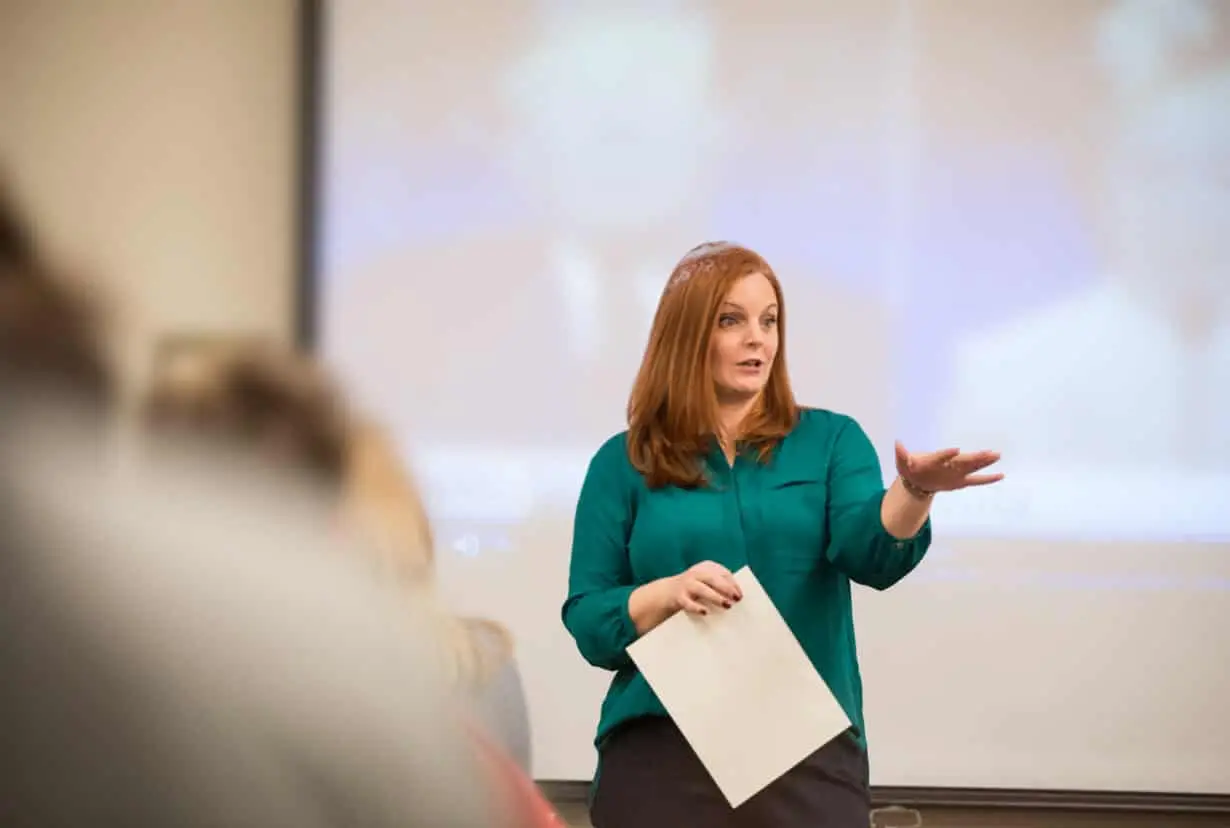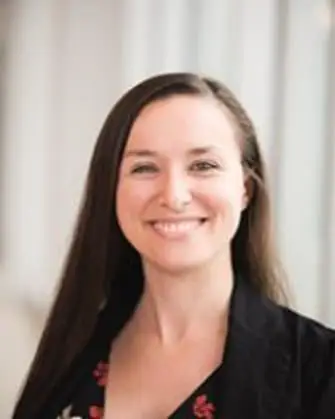Fairfield offers several financial resources for our graduate students to help you attain your advanced degree. Exceptional graduate students pursuing the Master of Public Health program may be considered for the Graduate Merit Scholarship

Gain practical experience while building your resume as you complete an applied public health capstone project and field experience internship.
Boost your success through a dedicated career coach. You'll unlock the BELONG program, a customized coaching journey focusing on career planning and building professional skills, positioning you for success beyond graduation.
Benefit from the interdisciplinary nature of community health as you learn from – and alongside – the same types of professionals you may work with in the future.
Fairfield University is an applicant for accreditation by the Council on Education for Public Health (CEPH). The accreditation review will address the Public Health Program, inclusive of the CEPH-accredited BS in Public Health and the online Master of Public Health. Other degrees and areas of study offered by this institution will not be included in the unit of accreditation review. For additional information on accreditation, please visit CEPH.

Students in Fairfield’s online Master of Public Health program are gaining invaluable hands-on experience through diverse field placements. Learn how their practical work builds confidence, shapes future career paths, and demonstrates the program’s real-world impact.


Join us on Jul 1, 2025, Tuesday, 04:00 PM MST for our upcoming information session to learn how Fairfield University’s Master of Public Health program can help you advance your career and achieve your goals! You’ll learn more about our program, the demand of the field, the admissions process, potential job opportunities, and more. Our enrollment coaches will be on hand to answer all of your questions. Plus, application fees will be waived for anyone who attends the webinar. We look forward to having you join us!
Our mission is to ensure students develop a comprehensive foundation in the theory and practice of public health with a strong emphasis on interprofessional collaboration, health equity, and evidence-based problem-solving.
The online MPH program’s goals describe strategies to accomplish the defined mission:
Tuition is $38,850 ($925 per credit hour).
Please see the Tuition and Financial Aid page for more information.
The MPH degree program at Fairfield University is open to students with a bachelor’s degree in any discipline, provided you have a minimum undergraduate GPA of 3.0 and a strong personal statement. It is an online MPH program with no GRE required.
Application and all supplemental materials must be received no later than three weeks before the start of each term. Applicants may be asked to participate in a Zoom interview as part of the application process.
Please note that Fairfield University cannot supply F-1 Visa I-20 documentation for international students enrolling in online or low-residency programs, like the Master of Public Health.
It’s easy to apply. Here are our requirements:
Ornare eget nunc ut consequat. Cras bibendum elit nam massa risus faucibus diam vitae. Amet quis mi arcu, amet pretium. Augue posuere ut lacus, adipiscing lorem elementum semper.
Ornare eget nunc ut consequat. Cras bibendum elit nam massa risus faucibus diam vitae. Amet quis mi arcu, amet pretium. Augue posuere ut lacus, adipiscing lorem elementum semper.
Ornare eget nunc ut consequat. Cras bibendum elit nam massa risus faucibus diam vitae. Amet quis mi arcu, amet pretium. Augue posuere ut lacus, adipiscing lorem elementum semper.
Anthony Santella, the Public Health program director at Fairfield University, brings a deep passion for public health that resonates throughout the classroom. In this video, he discusses his extensive research, commitment to improving the health of vulnerable communities, and how his dedication inspires and empowers students in the Master of Public Health program.
Earning an online MPH from Fairfield University positions you for a wide range of career options in the growing public health field. You will develop a broad base of knowledge and skills that can be applied to a variety of settings to protect and improve the health of people and communities.

Dr. Doughty brings extensive experience in public health research and education. She holds degrees in Nutrition & Dietetics (BS), Public Health (MPH), and Public Health Nutrition (PhD). Before joining Fairfield, she was a researcher at the Yale-Griffin Prevention Research Center, where she co-authored studies on school-based obesity prevention and nutrition-related health outcomes. Her primary interests include maternal and infant health, with a research focus on breastfeeding and early-life weight gain. Dr. Doughty is passionate about mentoring future public health professionals.

Dr. Anthony J. Santella is a Professor of Public Health and Director of the DrPH program. His research helps improve the sexual health of people living with and at risk for HIV/AIDS, gender and sexual minorities, justice-involved persons, youth, and people experiencing homelessness. Dr. Santella earned a MPH in Health Policy and Management from Emory University, a DrPH in Health Systems Management from Tulane University, an Advanced Graduate Certificate in Health Professions Education from Hofstra University and is a Master Certified Health Education Specialist.

Dr. Bridget Hussain is an Assistant Professor of Public Health. She is clinically trained as a Registered Dietitian and Certified Diabetes Care and Education Specialist. Her research examines the diet-disease relationship, identifying how nutrition can help prevent, treat, and manage chronic health conditions. Dr. Hussain earned an MS in Clinical Nutrition and Dietetics and PhD in Epidemiology from New York University.

Dr. Schindler-Ruwisch holds a BS in Psychology and Public Health (William & Mary), an MPH from Columbia University, and a DrPH in Health Behavior from George Washington University. Her research focuses on nutrition-related diseases, obesity, smoking cessation, and maternal/child health. She has explored mobile health (mHealth) to reduce disparities and improve health outcomes. Passionate about health education and prevention, her doctoral work examined breastfeeding practices among WIC participants. She brings energy and expertise to empowering students in community and behavioral health.
Credits – 3
This course provides an overview of the evolving structure of the US healthcare delivery system. Since the US healthcare system has been periodically changed in diverse aspects over the decades, its dynamic mechanism should be understood. Particularly the healthcare system encompasses organizations, management, finance, policy, and technology. This course introduces students to the complexity of healthcare, challenges of leadership, the key stakeholders, and the current state of healthcare in the US. As the introductory course for the MHA program, this hybrid course will allow student to acclimate to the program through multiple learning modalities and activities. Collaboration and team building, critical success factors in healthcare, will be a focus of the on-site portion of the course. The cohort will be introduced to many key aspects of healthcare administration as well as acclimating to the rich learning environment of Fairfield University.
Credits – 3
This course presents epidemiologic principles and biostatistical methods for the presentation and analysis of health-related data. Data from a variety of sources will be used to draw inferences about the health status of populations. Biostatistical techniques are used to examine relationships among contributing factors for population health in order to plan and evaluate health services and programs. Epidemiological methods for conducting studies will be discussed in detail, with an emphasis on group and population methods. Ethical issues related to the application of biostatistics and data privacy, such as IRB requirements, genomics, population genetics, clinical trials, and public health epidemiological studies are addressed.
Credits – 3
This course presents the foundational skills required for public health and healthcare provider students to engage in a systematic approach to population health. Disease prevention and health promotion are addressed through examination of social and behavioral determinants. Evidence-based strategies inform how to identify and assess at-risk populations, implement both preventive and therapeutic interventions, and evaluate outcomes at the population level. Models of health behavior change synthesize psychological, biophysical, cultural, ecological, environmental, and social dimensions to analyze population-based outcomes. The roles of national initiatives, public policy and cultural values are explored in relation to health equity to support population health at institutional, local, state, and national levels.
Credits – 3
This course is designed to introduce graduate students without a baccalaureate degree in Public Health to the profession and sciences of Public Health. This course will provide an overview of the history and philosophy of Public Health, its core functions and essential services, and its role in understanding and promoting human health.
Credits – 3
The focus of this course is on contemporary health policy, its development and implementation, and ways that public health and healthcare system leaders, can influence it. Students will evaluate the impact of health policy on health professionals, consumers, communities, and healthcare delivery systems. Resource allocation, along with the socioeconomic, political, legal, and ethical factors that influence health policy will be examined.
Credits – 3
The purpose of this course is to provide the student with the skills needed to develop either a research study proposal or a healthcare improvement proposal. This course prepares the student to identify practice problems and critique current research for relevance and application to practice. An overview of theory is presented as a vehicle for understanding public health or healthcare research. Basic concepts of qualitative and quantitative research methods will be examined in order to plan and evaluate a practice change or answer a research question. Using an evidence-based and/or research approach, students identify a clinical or public health problem within a specific population or setting, considering ethical issues. Students will develop a research study proposal or healthcare improvement proposal for implementation. Students use reflection in the evaluation of public health or healthcare system research.
Credits – 3
This course prepares students to develop, implement, and evaluate Public Health programs and interventions. Students will learn to conduct a community health assessment; prioritize health needs, capacities, and assets; select appropriate intervention strategies; and develop program and evaluation plans.
Credits – 3
This course provides an introduction to statistical reasoning and procedures used in Public Health research. Probability theory, descriptive and inferential statistics, and regression and correlation methods will be covered, with applications using statistical software. Pre-requisite NURS 7601.
Credits – 6
The fieldwork experience provides each student the opportunity to demonstrate attainment of key program competencies by completing training and practice with a partner agency in their local area. Students will participate in a public health leadership seminar while completing their fieldwork experience. This course will fulfill the applied practice experience requirement of the MPH program.
Credits – 3
Prerequisites: NURS 7601, PUBH 7602, PUBH 5303.
The capstone provides an opportunity for students to integrate and apply the knowledge and skills they’ve gained throughout the program by developing an independent scholarly or applied project. With guidance from a faculty member, students will create and evaluate a public health intervention or design and carry out an original research project. In Public Health Capstone I, students develop a detailed plan and written proposal for their project. This course will fulfill the integrative learning experience requirement of the MPH program.
Credits – 3
Prerequisite: PUBH 6961.
This course is a continuation of Public Health Capstone I. In this course, students complete their capstone projects, by implementing and evaluating the program they created or by collecting and analyzing data to answer an original research question. Students will produce a final paper and presentation for their project. This course will fulfill the integrative learning experience requirement of the MPH program.
Visionary by nature.
Jesuit Catholic by origin.
The driving force of Fairfield is our mission — to impact the world. It prompts us to ask important questions, to embrace our social responsibilities, and to lead by example. And it’s what has made us a premier institution in the Northeast. Let the mission be part of your journey.